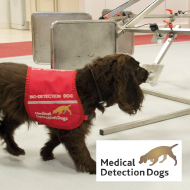
Charity aims to develop diagnostic test for canine bladder cancer
A new study is being carried out by Medical Detection Dogs, in order to assess whether cancer detection dogs can smell cancer in the urine samples of another dog.
The study, which is being conducted in collaboration with Davies Veterinary Specialists and part funded by The Kennel Club Charitable Trust, will investigate whether a cancer detection dog can be trained to detect canine bladder cancer from the odour of urine samples.
The purpose of the study is to hopefully devise a cheap, non-invasive and fast diagnostic test for canine urinary transitional cell carcinoma (TCC). Currently tests for this disease can be slow and misleading as it can look like several other urinary tract disorders when tested for.
Medical Detection Dogs also noted that the study could add to the understanding of what the profile for cancer smells like, helping cancer detection dogs in training in the future.
Currently, four dogs are being tested, of which two will be selected for the full project. The dogs are a mixture of spaniels and Labradors.
Urine samples collected from dogs with and without cancer will be used to train the dogs to differentiate between the two and to test their accuracy.
CEO and co-founder of Medical Detection Dogs Claire Guest said: “Dogs are renowned for their sense of smell and we know from many years of the dogs’ ability to detect human cancer, that it is a disease that has characteristic odours that they can pick out very successfully.
“It seems obvious that they could do the same for canine cancer and as the current screening tests are often inaccurate, not to mention very unpleasant for our beloved pets, we are very much looking forward to showing that dogs themselves could be the key to diagnosing this disease early in their four-legged counterparts.”
Image (c) Medical Detection Dogs.



 FIVP has shared a survey, inviting those working in independent practice to share their views on the CMA's proposed remedies.
FIVP has shared a survey, inviting those working in independent practice to share their views on the CMA's proposed remedies.